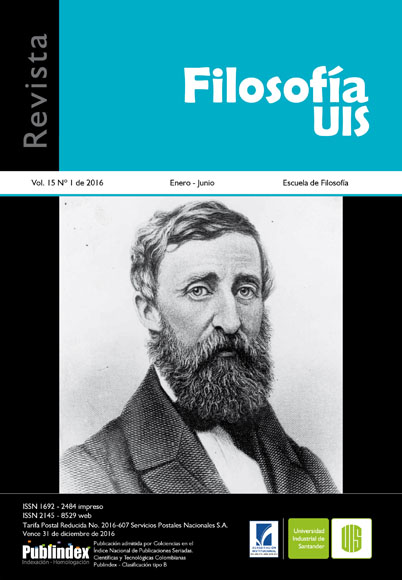Intentional attribution and rationality: A critical reading of Dennett’s Intentional Attribution Program
Publicado 2016-06-24
Palavras-chave
- Rationality,
- intentionality,
- Dennett,
- consciousness,
- intentional attribution
Como Citar
Copyright (c) 2016 Revista Filosofía UIS

Este trabalho está licenciado sob uma licença Creative Commons Attribution 4.0 International License.
Resumo
In this paper I introduce some of the key elements of Daniel Dennett’s theory of intentional attribution and their relation with his notion of rationality. While doing so I will show that Dennett’s approach implies a circularity in the process of attribution of rationality, and that his resource to evolutionary arguments for trying to avoid an infinite regress does not help him to avoid the problem. My presentation will include a revision of Dennett’s arguments for epistemic intentional ascription and rationality attribution as well as some criticisms developed against his proposal. At the end of the article I will extend the criticisms and present my view about his proposal for ideal rationality attribution.
Downloads
Referências
- Davidson, D. (1974). “Beliefs and the Basis of Meaning,” in Inquiries into Truth
- and Interpretation. Oxford: Claredon Press.
- Dawkins, R. (1976). The Selfish Gene. Oxford: Oxford University Press.
- Dawkins, R. (1986). The blind Watchmaker. Essex: Longman Scientific and Technical.
- Dennett, D. (1971). “Intentional Systems,” in Brainstorms. Philosophical Essays on Mind and Psychology, pp. 3-22. Montgomery: Bradford Book.
- Dennett, D. (1978). Brainstorms. Philosophical Essays on Mind and Psychology. Montgomery: Bradford Book.
- Dennett, D. (1979). “True believers,” in The Intentional Stance, pp. 13-36. Cambridge, Mass.: MIT Press. 1987.
- Dennett, D. (1987). “Error, Evolution and Intentionality,” in The Intentional Stance, pp. 287-321. Cambridge MA: MIT Press.
- Dennett, D. (1987). The Intentional Stance. Cambridge, Mass: MIT Press.
- Dennett, D. (1996). Kinds of Minds. Toward an Understanding of Consciousness. New York: Basic Books. Harper Collins Publisher.
- Dennett, D. (1998). Brainchildren. Essays on Designing Minds. Cambridge, MA: Bradford Book/ MIT Press.
- Fodor, J. (1981). “Three Cheers for Propositional Attitudes,” in Representations. Cambridge, Mass: Bradford Book/ MIT Press.
- Fodor, J. and Lepore, E. (1993). “Is Intentional Ascription Intrinsically Normative?” in Dahlbom, Dennett and his Critics. Demystifying Mind, pp. 70-82. Cambridge,
- Mass: Blackwell.
- Kim, J. (1988). “What is Naturalized Epistemology?” Philosophical Perspectives 2 Epistemology, 381-405.
- Stich, S. (1981). “Dennett on intentional systems”. Philosophical Topics, 12, 32-62.
- Stich, S. (1984). “Could Man Be an Irrational Animal?” Synthese, 64, 115-135.
